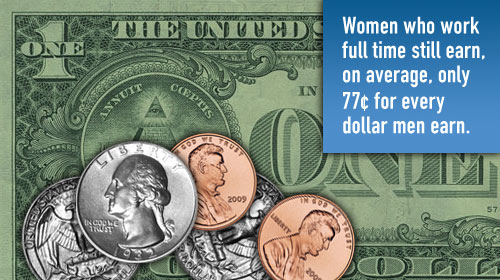
Over the last five decades, women have broken many barriers in education, business, and government. We need look no further than Congress to see the progress women have made: in 1963, Congress had only 14 women. In contrast, the new 113th Congress seated 97 women, the highest representation of women in United States history. The progress of women is also evident across the workforce. Today, women make up half of all workers in the United States and are increasingly becoming co- or primary breadwinners for their families.
But, while some things have changed for the better, there is still much more to do. Women haven’t reached parity in Congress, haven’t yet broken through the glass ceiling in boardrooms across America, and still haven’t achieved equal pay for the same work as men.
This year, on April 9, we commemorate Equal Pay Day, the day which marks how far into 2013 a woman needs to work to earn the same amount that a man earned in 2012. Because women still earn, on average, 23% less than men, this day serves as a reminder that women still must work extra months “catch up.”
This persistent wage gap exists despite the undeniable progress that women have made in the 50 years since the enactment of the Equal Pay Act of 1963, a groundbreaking piece of anti-discrimination legislation that aimed at closing the pay gap for men and women performing the same work. When President Kennedy signed the Equal Pay Act, women earned 59 cents for every dollar earned by a man.
A half century later, women are still only making 77 cents to the dollar. That is only 18 more cents since the protections went into place. Additionally, women of color are earning approximately what women overall were earning before the passage of the EPA—African American women are earning 64 cents and Latinas 55 cents to every dollar earned by a white man.
On this Equal Pay Day, we must urge Congress to pass the Paycheck Fairness Act. The Paycheck Fairness Act provides a much needed update to the Equal Pay Act – a law that has not been able to achieve its promise of closing the wage gap because of limited enforcement tools and inadequate remedies. In particular, the legislation would prohibit retaliation against workers who inquire about their employers’ wage practices or disclose their own wages and requires that employers demonstrate that wage differences between men and women doing the same work have a business justification and are rooted in factors other than sex. It also levels the playing field by ensuring that women can obtain the same remedies as those subject to discrimination on the basis of race or national origin, all while guaranteeing protections for small businesses.
Since passage of this bill won’t happen immediately, President Obama can do something right now to help. Right now, nearly half of all workers can be fired or strongly discouraged from discussing their pay with colleagues. The President can sign an executive order that would protect those working for federal contractors from being retaliated against for disclosing or asking about their wages. Last week the ACLU organized a letter signed by over 100 organizations and chapters, urging the President to do just that. An executive order for federal contract employees would affect 26 million people across the country, a significant step toward equality.
We have made great progress in women’s rights, but earning 18 more cents in 50 years is not fast enough. We urge Congress and the President to take action, so that next year, on Equal Pay Day, we will be one step and many cents closer to achieving pay equity.
Learn more about paycheck fairness and other civil liberty issues: Sign up for breaking news alerts, follow us on Twitter, and like us on Facebook.


